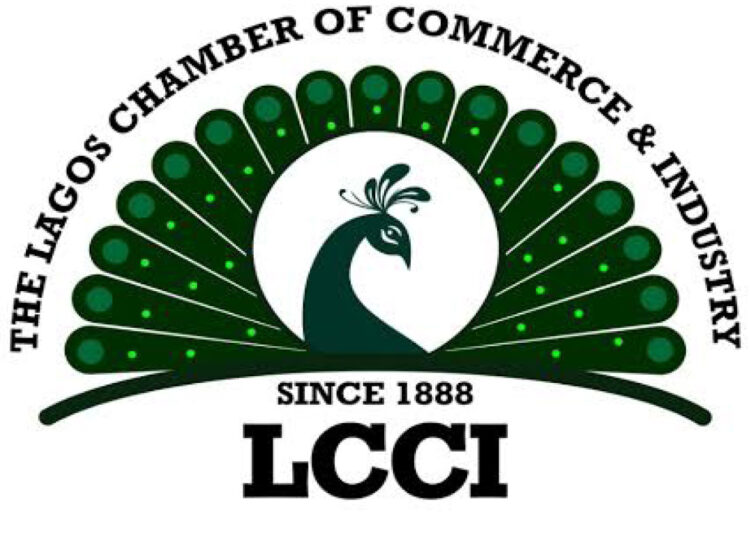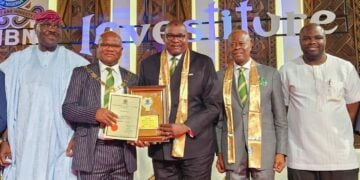Despite Nigeria’s Gross Domestic Product (GDP) growth, Lagos Chamber of Commerce and Industry (LCCI) has said economic conditions have pushed a significant portion of the population into poverty, with inflationary pressures eroding purchasing power and the cost of living continuing to rise.
This is as other economic players pointed out that though inflation rate has declined to 22.22 per cent, which is considered high, it could have reached 33 per cent, if the Consumer Price Index (CPI) had not been rebased.
Nigeria’s GDP grew by 3.13 per cent year-on-year in real terms in the first quarter of 2025, marking an improvement from 2.27 per cent in the same period of 2024.
The president of LCCI, Gabriel Idahosa stated this at the third press conference of 2025 on the state of the economy held on Wednesday, in Lagos.
He stated that the rebasing from the 2010 to 2019 base year brings Nigeria closer to global statistical standards and reveals a more diversified economy, where real estate, trade, telecoms, and crop production dominate, while oil’s share continues to decline.
He, however, said, “Behind the optimistic figures lies our reality. Economic conditions have put a large portion of the population into poverty, and inflationary pressures have weakened our purchasing power, and the cost of living has continued to rise.
“Inflation remains unrelenting, especially in the food segment, an alarming indicator in a country where most household expenditure is food-related. The naira’s depreciation, now hovering above N1,530 per dollar ($), has severely diminished real incomes, while energy costs, from petrol and diesel to cooking gas, remain painfully high. These pressures affect both households and businesses, worsening inequality and making daily survival a struggle for many.”
He said that this is a call to action and the government must move from statistical celebration to strategic economic transformation.
Stabilising Naira a top priority
Idahosa stated that stabilising the naira must be a top priority. This requires restoring FX confidence, boosting non-oil exports, and supporting domestic production.
Food security must be urgently addressed through input subsidies, storage systems, and improved logistics to combat inflation and hunger, he said.
The LCCI president also urged the government to intensify efforts to empower MSMEs and the informal sector through access to finance, aggressive operationalisation of the 2025 Nigerian Tax Reform Act, and deployment of digital tools.
“We need targeted job creation programmes, especially in agriculture, construction, and technology, backed by aggressive skills development. Restore citizens’ confidence through transparency, social protection, and visible policy implementation.”
He noted that International development agencies like the World Bank and the IMF had projected Nigeria’s GDP growth at 3.6 per cent and 4.1 per cent in 2025, respectively, to be driven by an expected increase in oil production and the services sectors, such as financial services, telecommunications, and ICT.
“Improvement in local refining capacity is expected to ease energy costs, save foreign exchange spending, and attract more investments into the oil and gas sector,” he stated.
Idahosa urged the government to pay continuous attention to inflation and the foreign exchange market and sustain efforts in fiscal and monetary policy interventions.
Meanwhile, while some finance analysts lauded the recently rebased Gross Domestic Product (GDP), saying the figures signaled ongoing recovery, driven by services and industry sectors, others believe the figures do not reflect the current economic reality.
The Monetary Policy Committee (MPC) of the Central Bank of Nigeria (CBN) rose from its 301st meeting, leaving all parameters unchanged.
At the end of its July 2025 Monetary Policy Committee (MPC) meeting, all 12 members voted to retain the MPR at 27.50 per cent, the asymmetric corridor around the MPR at +500/-100 basis points, the Cash Reserve Ratio of Deposit Money Banks at 50.00 per cent and Merchant Banks at 16 per cent, and the Liquidity Ratio at 30.00 per cent.
Reacting to this development, Michael Obadan, a former MPC member and Professor of Economics, noted that despite a marginal decline in inflation, the underlying drivers remain firmly in place.
Drivers of Inflation and Insecurity have not improved
Obadan stated that the rate of inflation is still very high at 22.22 per cent as reported for June,
He said: “If the Consumer Price Index had not been rebased, we would still be talking about over 32 to 33 per cent inflation. The factors driving inflation. monetary expansion, bloated fiscal spending, and insecurity, have not improved significantly.”
He expressed concern over the government’s continued expansive fiscal behaviour, pointing to the over N52 trillion budget and persistent borrowing.
According to him, “the triggers of inflation are still very much active as insecurity continues to hamper food production. We are in the planting season now, and the food supply is not strong enough to ease prices.”
Professor Obadan also noted that monetary policy has been constrained by weak fiscal support.
“The complementarity between fiscal and monetary policy that would help tame inflation is not there. In fact, fiscal behaviour is driving monetary policy in a way that limits its effectiveness,” he said.
Similarly, the head of Financial Institutions Ratings at Agusto & Co, Ayokunle Olubunmi said the CBN’s decision came as no surprise, given the fragility of macroeconomic indicators.
“If you look at the macro data, things are still fragile. Inflation has only reduced slightly, and some analysts believe deflationary pressures are emerging. Exchange rate stability is also not yet firm. In this situation, the best approach is to hold rates and wait,” he noted.
On his part, the chief executive of the Centre for the Promotion of Private Enterprise (CPPE), Dr. Muda Yusuf, also backed the decision, stating that it aligns with the CBN’s inflation-fighting posture.
“Many of us expected the Central Bank to hold rates. As long as inflation has not moderated significantly, it is unlikely they would opt for rate cuts.
“In fact, while headline inflation decelerated marginally to 22.22 per cent, the month-on-month data showed increases in headline, food, and core inflation in June”, he said.
Yusuf acknowledged the downside of high interest rates, especially for the real sector, but noted that the monetary stance has helped attract foreign portfolio inflows.
“The tight monetary policy has supported forex inflows, particularly from portfolio investors who find the high yields attractive. This has benefits for the financial markets but continues to burden borrowers and real sector players who face rising debt servicing costs,” he said.
Economists laud rebasing exercise
Meanwhile, experts have applauded the recent rebased Gross Domestic Product (GDP), saying, the figures signal ongoing recovery, driven by services and industry.
Dr. Muda Yusuf said while the final figures may not have been as dramatic as some anticipated, they do provide a much clearer understanding of the actual structure of the economy
Analysts at Coronation stated that Nigeria’s real GDP expanded by 3.13 per cent year-on-year in Q1 2025, reflecting a continued recovery and an improvement from the 2.27 per cent recorded in Q1 2024.
“However, the oil sector’s contraction and muted agricultural rebound highlight weaknesses in the developing recovery story in two key sectors.
“Sustaining growth will depend on improved macroeconomic stability, sustainability of the FX reforms, and targeted support for underperforming sectors,” they said.
Also, Cowry Assets Management Limited noted that the rebased GDP series gives a more refined picture of Nigeria’s economic evolution since the COVID-19 pandemic, which triggered a negative 6.96 per cent recession.
It pointed out that “the revised figures indicate that recovery from the pandemic began in earnest in 2022 with a growth rate of 4.32 per cent, followed by 3.04 per cent in 2023 and 3.38 per cent in 2024.
“The updated figures also highlight the impact of exchange rate instability on GDP valuation. With the new base year, Nigeria’s economy is now valued at $243.9 billion for 2024, significantly higher than the earlier estimate of $181.5 billion, although still a far cry from the 2019 nominal level of $672.4 billion.
“However, the NBS rebasing does not yet capture several additional activities initially considered for inclusion, leaving some gaps in the new methodology. This limits the full reflection of the informal and emergent sectors’ contribution to the economy.”
How to achieve $1 trillion economy
Looking ahead, Cowry said that “achieving the government’s ambitious target of growing Nigeria’s economy to $1 trillion by 2030 will be a formidable challenge.
“Based on current trajectories, Cowry Research estimates that Nigeria would need to grow its GDP at an average quarterly rate of 15 per cent to 25 to reach this milestone. Importantly, exchange rate stability will be critical to this goal.
“Sustaining a Naira exchange rate between N350/$1 and N600/$1 will be vital in ensuring the country realises stronger nominal GDP figures by 2030,’ they stated.
Meanwhile, a development economist at Adeleke University, Professor Tayo Bello, noted that rebasing is a way of integrating growing sectors not hitherto included in the GDP. He added that the services sector is growing and that certain growth indices had not been included in the calculation of the GDP before now.
“Before now the NBS was using 2014 as the base year to calculate the GDP, which is outdated now to calculate the GDP and rates of inflation.
“In order to incorporate and expand the new data, that exercise was necessary. So inflation and GDP will now be based on accurate data.
“If you cast your mind back to 15 years ago, it did not include the use of data and other services as it does today. All of that needs to be captured in the rebased GDP; I’m in full support of it,” he said.





